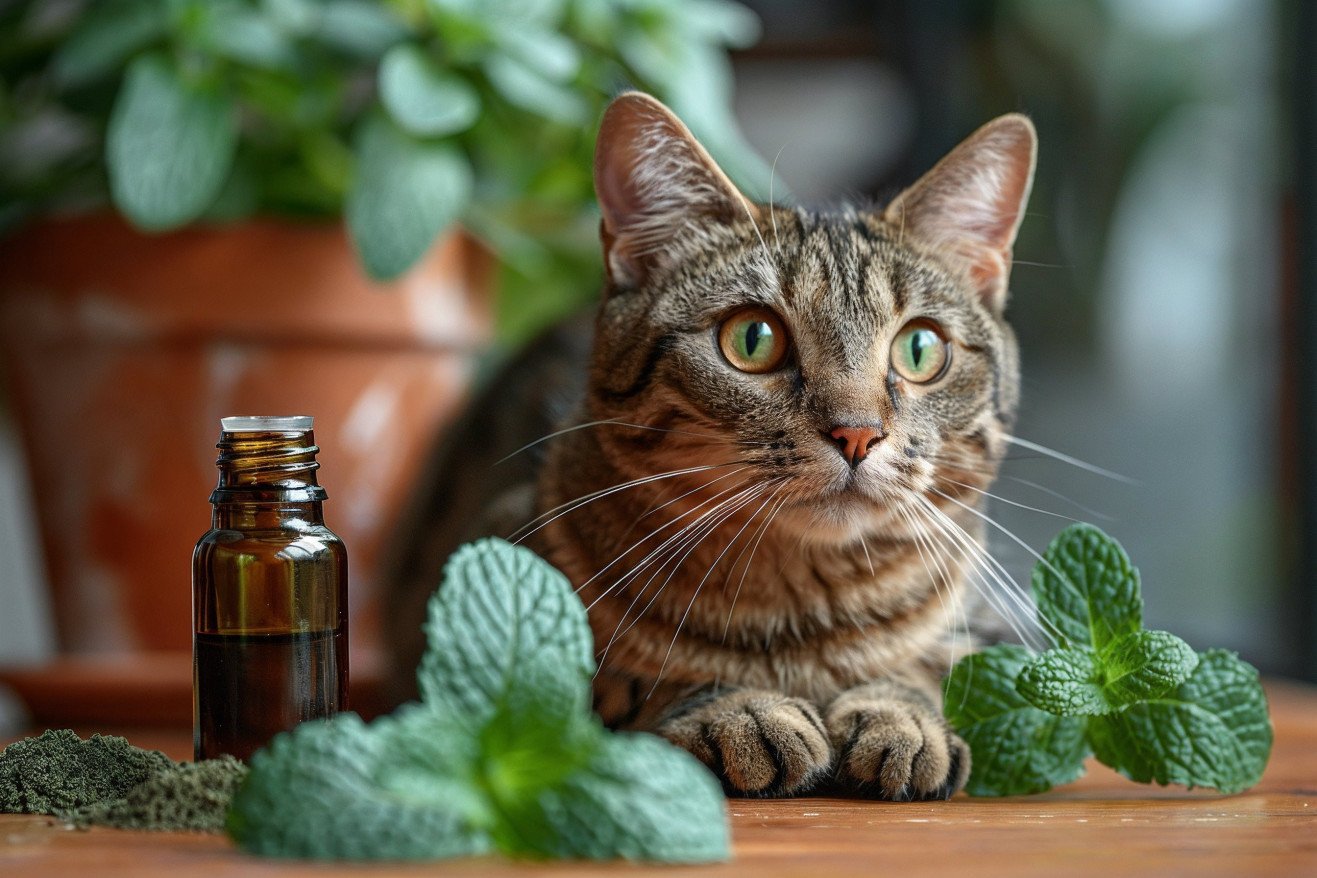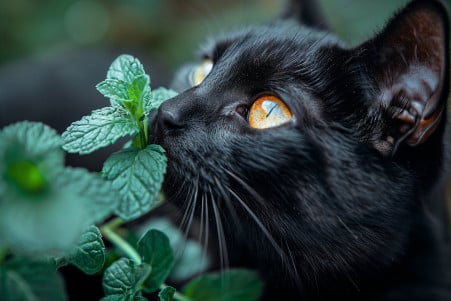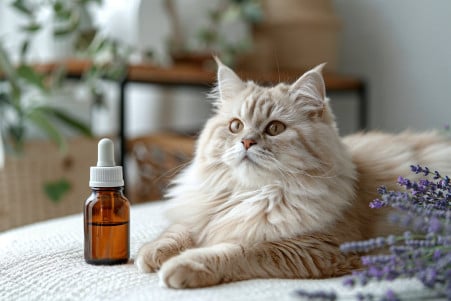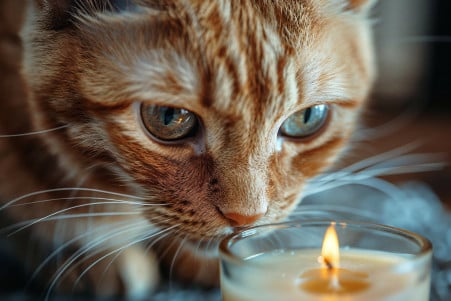Can Cats Smell Peppermint Oil? What Pet Parents Should Know
19 May 2024 • Updated 18 May 2024

If you're a holistic pet parent, you've probably wondered if your cat can smell the invigorating aroma of peppermint oil and whether it's safe for them. While cats don't like the strong smell of peppermint, it can be used to keep them away from certain areas or objects because of their dislike of the scent. That said, peppermint oil is toxic if ingested in large amounts, so it should be used with caution and diluted when used topically.
We'll look at veterinary studies, research on feline behavior, and advice from experts to help you better understand how cats react to this aromatic oil. By learning about their sense of smell and how to use it, you'll be able to make sure your cat is happy and healthy while using peppermint oil in a way that's mindful of your pet.
Can cats smell peppermint oil?
Peppermint Oil Toxicity in Cats: What to Know
Peppermint oil is especially dangerous to cats because of their unique biological makeup. VCA Animal Hospitals explains that cats have a deficiency in certain liver enzymes that are necessary to break down the chemical compounds in essential oils like peppermint, which makes them more susceptible to toxicity.
Even small amounts of peppermint oil can cause symptoms. The American College of Veterinary Pharmacists notes that peppermint oil can cause nausea, vomiting, altered mental status, lethargy, and even liver failure in cats. Just inhaling the concentrated fumes or absorbing the oil through the skin can lead to negative side effects like difficulty breathing, drooling, lethargy, and skin irritation.
Most importantly, there is no known safe level of peppermint oil exposure for cats. Any exposure to peppermint oil, whether it’s ingested, inhaled, or absorbed through the skin, can be toxic to cats. If you think your cat has been exposed to peppermint oil, it’s important to seek out veterinary care right away to reduce the risk of toxicity. Given their susceptibility, it’s important to be very careful about using peppermint oil products in homes where cats are present.
Peppermint Oil for Cats: Can It Kill Fleas and Ticks?
Some cat parents have turned to peppermint oil as a natural way to kill fleas and ticks on their pets. However, Catster notes that there is little scientific research to back up the idea that peppermint oil is an effective flea and tick control option for cats. Most vets advise against using essential oils, including peppermint oil, to treat fleas and ticks because of the potential for toxicity, as PetMD explains.
Cats have had negative reactions to products that contain peppermint oil and other essential oils, Catster says. While some plant-based oils may work as a flea repellent, there is no scientific evidence that peppermint oil is an effective way to kill or repel fleas on cats. Given the lack of research and the potential for harm, it's important for cat parents to work with their vet to find safe, effective flea and tick control options.
Safer Alternatives to Peppermint Oil for Cat Owners
Essential oils such as lavender, chamomile, and cedarwood are generally safer for cats than peppermint oil. Forbes Advisor notes that these oils are less likely to lead to negative reactions in cats. Pheromone diffusers and calming products are also available to help create a relaxing environment for cats without the use of essential oils.
If you do use essential oils around cats, it’s important to talk to a vet first, stick to oils that are safe for cats and are properly diluted, and watch for signs of negative reactions. Rocky Mountain Oils explains that diffusing essential oils around cats can be dangerous, so you need to take precautions, such as making sure the room is well-ventilated and limiting the cat’s exposure.
In terms of natural flea and tick control, safer alternatives to essential oils include keeping the yard clean, using EPA-approved commercial products, and checking for fleas and ticks regularly. According to PetMD, the best way to protect cats from fleas and ticks is to use FDA-registered and EPA-approved prevention products that are recommended by a vet.
DIY Cat Repellent Sprays: Other Natural Alternatives to Peppermint Oil
Many cat owners have turned to homemade repellent sprays to keep cats out of certain areas. Alley Cat Allies notes that cats can be deterred by the use of fragrant items like citrus peels, vinegar, or the essential oils of lavender, lemongrass, citronella, or eucalyptus. These strong, pungent smells are off-putting to a cat's sensitive nose.
DIY cat repellent sprays can also be made with ingredients like crushed garlic, pepper, rosemary, and lemon or orange juice. While some essential oils like rosemary may be effective, it's important to consider their safety for cats, as Mom4Real warns.
Physical barriers like chicken wire, sharp mulch, or motion-activated sprinklers can also keep cats away from certain areas. Planting strong-smelling herbs and flowers, such as citronella, rue, or prickly geraniums, can also act as a natural deterrent in gardens.
It's important to make sure that any homemade sprays or deterrents are safe for cats and don't pose any health risks. A veterinarian can help pet owners determine the most effective and cat-safe options.
Can Peppermint Help Cats With Any Health Issues?
Although some cat owners may think that peppermint can help their pets with certain health issues, there is little scientific evidence to back up these claims. Wondercide notes that peppermint is not a common ingredient in veterinary medicine and is not recommended as a supplement for cats. In addition, peppermint and peppermint oil can be toxic to cats and cause negative side effects.
Organic Aromas even goes so far as to say that any potential benefits of peppermint for cats are not worth the risks of exposure or ingestion. As a result, it's always best to talk to a vet before giving a cat any new herbs or supplements.
Conclusion: Using Peppermint Oil Safely Around Cats
Although peppermint oil may have some uses, it's generally not safe to use around cats. This is because cats have a strong sense of smell and are sensitive to the smell of peppermint oil. Ingesting or being exposed to large amounts of peppermint oil can be toxic to cats.
As a result, cat owners should be careful when using peppermint oil in their homes and look for other ways to protect their cats from fleas and ticks or keep them from certain areas. It's also important to talk to a vet and follow their advice when considering using essential oils or other natural products around cats.


